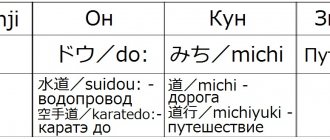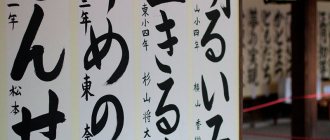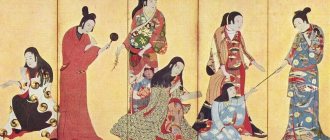Fans of Japanese culture and martial arts in particular often use additional suffix words with their names. They indicate that a person belongs to one or another rank in the system of titles, ranks, and dans. This tradition has been preserved since ancient times and still remains today. There are often cases of erroneous or double interpretation of terms such as sensei, shihan, soke, kaicho and others. Who is senpai in this case? Does it make sense to use this term when communicating in a non-Japanese culture?
In budo
In budo, senpai are those who practice this type of budo for the most time.
Rank Senpai
relative. If one person is more experienced than another in a certain type of budo, then he will be a senpai, while the less experienced will be a kohai.
Kohai
(Japanese 後輩,
ko: hai
, lit. “comrade standing behind”) - a person less experienced in this type of budo.
In the dojo you receive the title of senpai
or
kohai
, when you begin to practice a specific type of budo. And this relationship doesn't really change depending on what rank you have in this budo.
A situation is possible where a kohai receives a higher rank than a senpai. In this case, the kohai's position in the dojo will be higher than that of his senpai. But he is still a kohai, just with a higher rank.
Senpai are still students, only they have been students in the dojo longer than their kohai, which is why they are called senpai.
Since the senpai know more about their dojo and the type of martial art they practice, they teach the kohai. They teach rules, etiquette, and manners in the dojo.
Many kohai complain about their sempai for being too bossy. Senpai is not a commander for a kohai. Senpai must be a good mentor. Kohai must listen not only to the sensei, but also to what the sempai teach them.
Both senpai and kohai in the dojo must treat each other with respect
no matter what.
Do you know the answer?
Items
New questions
Site rating
- 1. Sergey Naumov 258
- 2. Igor Proskurenko 219
- 3. Daniil Vasiliev 169
- 4. Igor S 150
- 5. aleqsandr sagrishvili 149
- 6. Ulyana Potapkina 136
- 7. Alexander S 130
- 8. Alsou Sakaeva 118
- 9. Der Pro 113
- 10. Elizaveta Ancherbak 106
- 1. Kristina Volosocheva 19.120
- 2. Ekaterina 18,721
- 3. Yulia Bronnikova 18,580
- 4. Darth Vader 17,856
- 5. Alina Saibel 16,787
- 6. Maria Nikolaevna 15,775
- 7. Larisa Samodurova 15,735
- 8. Igor Proskurenko 15,453
- 9. Liza 15,165
- 10. TorkMen 14,876
The most active participants of the week:
- 1. Victoria Neumann – bookstore gift card for 500 rubles.
- 2. Bulat Sadykov – bookstore gift card for 500 rubles.
- 3. Daria Volkova – bookstore gift card for 500 rubles.
Three lucky people who passed at least 1 test:
- 1. Natalya Starostina – bookstore gift card for 500 rubles.
- 2. Nikolay Z – bookstore gift card for 500 rubles.
- 3. David Melnikov – bookstore gift card for 500 rubles.
The cards are electronic (code), they will be sent in the coming days via VKontakte message or email.
Source of the article: https://obrazovaka.ru/question/senpaj-i-sempaj-raznica-chem-otlichaetsya-66845
In anime
These terms are also used among otaku, often appearing in anime and manga. Falling in love with senpai
is quite common in Japan and this is reflected in the prevalence of this theme in shoujo manga and literary works in the romance genre. Since there are no satisfactory analogues for these terms in other languages, they are often omitted in official translations, and in unofficial ones (fansub, scanlate) they are used without translation both as a separate term and as a nominal suffix.
"Notice me, senpai"
In the mid-2000s, the word "senpai" entered Western youth slang. It refers to any person with whom you are in love or with whom you want to be friends, but he does not pay attention.
All the fan’s behavior is aimed at getting the object of his adoration to notice him. The best wish for him on New Year and birthday is “may your senpai notice you.”
memesmix.net https://img.anews.com/media/gallery/108324727/446802526.jpg
In the 2010s, the phrase “notice me senpai” became a popular meme. Fans tagged photos of their favorite celebrities on social networks with this tag, then websites and accounts appeared where manga and anime experts began posting thematic texts and pictures.
And in 2014, the world’s most popular video blogger PewDiePie made a video of all the moments when he said “notice me, senpai” in the frame. After this, the phrase became iconic.
PewDiePie / YouTube / Tenor https://img.anews.com/media/gallery/108324727/5083486.gif
see also
- types and styles in kempo
- schools in kempo
- Polivanov's system - rules for transcribing Japanese words in Russian
Wikimedia Foundation. 2010.
See what “Senpai and Kohai” are in other dictionaries:
- - ... Wikipedia
Senpai (先輩, lit. "comrade in front") is a Japanese term, sometimes used as a noun suffix, for a person (regardless of gender) in an organization, usually a school or college, sometimes a sports or other club, who ... ... Wikipedia
- (Japanese: 日本語の敬称 nihongo no keisho:) suffixes that are added to a name (surname, nickname, profession, etc.) when talking with or about a person. Nominal suffixes play an important role in Japanese communication. They indicate social... ... Wikipedia
Kancho (Japanese 館長 kancho:?) title in budo, Japanese kempo, is awarded to a very high-level budoka who has mastered all aspects of the budo he studied, founded his own organization (type, ryu style or school) and became its head. Among all... ... Wikipedia
Japanese culture has been formed over dozens of centuries. Traditions and customs in the Land of the Rising Sun occupy a special position. Modern Japanese honor the memory of their ancestors, observe basic customs and tell their heirs about them. Japan has also become famous for its martial arts. The art of wielding a katana, karate and other traditional martial arts were formed in ancient times. And it was from that time that such concepts as “senpai” and “kohai” came. However, these terms did not become more common because of martial arts. Anime gave them wide popularity. Thanks to the animation, even the youngest anime fans know who Senpai and Kohai are.
Hazing in Japanese
The hierarchical relationship between senpai and kohai is similar to our hazing, if we ignore its worst manifestations - monstrous beatings and bullying. Senpai means “grandfather”, kohai means “new guy”.
The rules of seniority are established from the moment a person joins any organization - a school club, sports section, martial arts school, business company, etc. A newcomer of any age and level of knowledge becomes a kohai (i.e., lower in the hierarchy) in relation to those who joined the organization before him. He himself will become a senpai only for those who come later.
Senpai has the right to urge the kohai, and he is obliged to carry out his instructions and show respect. For example, in school sports sections, new students are not allowed to play at first, but only carry balls, clean the playground, and even wash the senpai’s uniform.
In Western culture, such relationships are often observed in groups of teenagers: they hang out together and are considered friends, but the younger ones are at the beck and call of the older ones.
Still from the film “Mid-90s” (2018) https://img.anews.com/media/gallery/108324727/286477966.jpg
Senpai and Kohai: the history of hieroglyphs
The words, or rather the hieroglyphs “senpai” and “kohai”, originated not in Japan, but in China.
The first mention dates back to the fifth century BC. The emergence of such words as “kohai”, “senpai” and “sensei” is due to the characteristics of Eastern cultures, the basis of which is the veneration of those who are older and more experienced. In the east, it is believed that the elder, regardless of the circumstances, is wiser and more experienced than those who are younger. Thus, the younger generation should respect the older ones. In Japan and China, the default teacher is older and more experienced. Students must treat him with respect. To understand who senpai is, you will need to turn to the ancient teachings of Kunzi, which formed the basis of Confucianism. Prosperity and success are possible only by honoring ancestors, that is, those who are smarter and more experienced.
Senpai and Kohai concept
The Japanese are a very polite nation.
And, of course, senpai/kohai relationships are only possible in Eastern cultures. When talking to strangers, the Japanese always show tact and will not be rude in return. It is almost impossible to get a categorical negative answer from them. In everyday speech they use many respectful suffixes. And for many years they can call their colleagues and even friends only by their last name. Addressing someone directly by name and without a respectful suffix is considered familiar. For them, the interaction between senpai and kohai does not raise questions. Who senpai and kohai are can be understood from the example of a dojo. For example, a Japanese man came to the dojo to practice martial arts in 2016. Everyone who trained here before is his senpai. The older comrade started training earlier and, accordingly, he will receive the second dan earlier. However, during preparation, Senpai was injured and left the dojo for two years. At this time, Kohai was able to receive his second dan. After some time, senpai returned. And although he will only have first dan, he will remain a senpai, since he came to the dojo earlier. Rank does not affect the relationship between older and younger students. The Japanese are particularly scrupulous about time. You can become a senpai for a person who came to the dojo the next day. Those who started classes at the same time usually call each other “dohai.” Kanji "Do" is the same and equal comrade.
Do you know the answer?
Items
New questions
Site rating
- 1. Sergey Naumov 258
- 2. Igor Proskurenko 219
- 3. Daniil Vasiliev 169
- 4. Igor S 150
- 5. aleqsandr sagrishvili 149
- 6. Mikhail Azrapkin 142
- 7. Ulyana Potapkina 136
- 8. Alexander S 130
- 9. Alsou Sakaeva 118
- 10. Der Pro 113
- 1. Kristina Volosocheva 19.120
- 2. Ekaterina 18,721
- 3. Yulia Bronnikova 18,580
- 4. Darth Vader 17,856
- 5. Alina Saibel 16,787
- 6. Maria Nikolaevna 15,775
- 7. Larisa Samodurova 15,735
- 8. Igor Proskurenko 15,453
- 9. Liza 15,165
- 10. TorkMen 14,876
The most active participants of the week:
- 1. Victoria Neumann – bookstore gift card for 500 rubles.
- 2. Bulat Sadykov – bookstore gift card for 500 rubles.
- 3. Daria Volkova – bookstore gift card for 500 rubles.
Three lucky people who passed at least 1 test:
- 1. Natalya Starostina – bookstore gift card for 500 rubles.
- 2. Nikolay Z – bookstore gift card for 500 rubles.
- 3. David Melnikov – bookstore gift card for 500 rubles.
The cards are electronic (code), they will be sent in the coming days via VKontakte message or email.
Source of the article: https://obrazovaka.ru/question/sempaj-ili-senpaj-kak-pravilno-senpai-ili-sempai-65760
Senpai and Kohai in the anime
In addition to the dojo, work, study and other aspects of Japanese life, you can find out who senpai and kohai are from anime and manga.
One of the most common areas of animation and printed materials is shojo. The kanji for "shojo" translates to girl. And the target audience for shojo anime and manga are girls between the ages of twelve and eighteen. The main characters are usually young people who are going through some difficulties. As a rule, in such anime and manga the main character - kohai - falls in love with her senpai. When translating dialogues and texts, a small problem arises: what to do with the words “kohai” and “senpai”. Translation into other languages is impossible, since there are no analogues to these concepts. Thus, in official translations the terms are omitted. But in amateurs, the words are not translated, but simply added to names, for example, Yamato-senpai. It is worth noting that it is not only in dojos and anime that the terms “senpai” and “kohai” are used. Although hieroglyphs came from the fifth century BC, they actively participate in the life of ordinary Japanese. In companies and offices, employees often call those who got hired earlier senpai. This way they show respect to their colleagues and are not afraid to come up and ask for advice in case of difficulties.
In the section on the question What does the word “Senpai” mean? given by the author Reroll
the best answer is
Senpai (先輩, lit. "comrade in front") is a Japanese term, sometimes used as a noun suffix, for a person (regardless of gender) in an organization, usually a school or college, sometimes a sports or another club that is older in age or simply more experienced.
In budo, sempai is the senior student of any dojo. A Budoka who has reached Shodan or Nidan (1st, 2nd Dan) is called Senpai. Above senpai in the hierarchy are sensei, shihan and kancho. Source: Internet Answer from Alla Dunets
[newbie] Senpai is the person in front or the person who is scarier than you
Reply from Dry out
[newbie] he stands behind you and rubs you affectionately)
Answer from Eurovision
[guru] comrade standing in front
Answer from Yotefan Orynbekov
[newbie] yes
Answer from ? Bianca Lipnitskaya
[active] He is in the game Yandere Simulator.
Answer from Elena Filippova
[newbie] Or the person the girl is in love with (yandere simulator): DD
Reply from Take Delovoi
[novice] Senpai (Japanese ??, lit. "comrade in front") is a Japanese term usually referring to the person who has more experience in a particular area. In this case, age does not matter. If one person does something longer than another, then he is a senpai. senpai Definitions on the Internet (sensepai) is a term more typical of karate schools, implying in different variations an instructor, a senior student, or simply a senior in qualification, an assistant sensei.
Answer from Ono Gasai
[newbie] Senpai is a person who is older than you in age, etc.
Answer from Yamar Pereshakhin
[newbie] Senpai is the oldest person in any institution (be it school or work).
Hello.
Let's get started.
Sensei is a polite address to a teacher, doctor, writer, boss or other significant person or a significantly older person.
Senpai is a term that usually refers to a person who has more experience in a particular activity. If one person does something longer than another, then he is a senpai.
Kohai is the opposite concept: a person who is less experienced in some field of activity.
And so, that was the scientific, short explanation. Boring, right? I'll try to explain it more cheerfully.
Reality.:
The Japanese character "sepmai" translates as "comrade" or "standing in front." In colleges, colleges, schools, etc., little kids add this word to the name of the person who is better at their activity.
:exclamation: Don't confuse Senpai with Sensei:exclamation:
Senpai is a person superior in ACTIVITY, and nothing more.
I'm probably going to blow someone's mind now, but in reality it's quite understandable.
In the Anime, Senpai is a little different. Yes, this is also a person who is superior in activity, but in anime this term is also used by a girl to refer to an older guy whom she loves. (Well, or vice versa.)
But with Sensei, age plays a huge role. Mostly these are teachers whom you respect. If a person is younger than you, but better in some ways, he is not a sensei.
Kohai" consists of two characters "Ko" and "Hai". "Hai" means colleague or friend in Japanese. "Co" means after or later. It turns out that a kohai is someone who started training later.
These people have less experience, so when problems arise, they should turn to their senpai for help. Also, in many areas of Japanese life, taking care of newcomers falls on the shoulders of senpais.
Fans of Japanese culture and martial arts in particular often use additional suffix words with their names. They indicate that a person belongs to one or another rank in the system of titles, ranks, and dans. This tradition has been preserved since ancient times and still remains today. There are often cases of erroneous or double interpretation of terms such as sensei, shihan, soke, kaicho and others. Who is senpai in this case? Does it make sense to use this term when communicating in a non-Japanese culture?
Nominal suffixes in Japanese
Nominal suffixes in Japanese
(Japanese: 日本語の敬称
nihongo no keisho:)
- suffixes that are added to a name (surname, nickname, profession, etc.) when talking with or about a person. Nominal suffixes play an important role in Japanese communication. They indicate the social status of the interlocutors relative to each other, their attitude towards each other, and the degree of their closeness. By using any nominal suffix, you can insult your interlocutor, or vice versa - express your deepest respect to him.
Addresses without a suffix are common in relation to adults to teenage children, friends to each other, etc. If a person does not use suffixes at all, then this is a clear indicator of rudeness. Calling by last name without a suffix is a sign of familiar, but “detached” relationships (a typical example is the relationship of schoolchildren or students).
The most common nominal suffixes
-san
-san (さん)
- a neutral-polite suffix, quite closely corresponding to addressing by first name and patronymic in Russian. It is widely used in all spheres of life: in communication between people of equal social status, when younger people address elders, and so on. Often used when addressing unfamiliar people. In addition, it can be used by a romantically inclined young man in relation to his beloved.
However, it should be taken into account that in women’s speech this suffix loses its honorative meaning and is used for almost all names. That is, Japanese women address everyone with “-san,” even the closest people (excluding children). This explains the fact that in Japanese films, as well as in anime, women say “-san” even to their husbands. In this case, the suffix does not mean addressing “you”. However, modern young women and girls are less formal in their speech and use “-san” mainly as a neutral-polite suffix.
-kun
-kun (君, you)
- warmer than “-san”, a polite suffix. Signifies significant closeness yet somewhat formal relationships. An approximate analogue of the address “comrade” or “friend”. It is used by people of equal social status, most often by friends, classmates, colleagues, when older people address juniors, as well as when a boss addresses a subordinate, when this fact is not worth focusing on.
This suffix has two dependencies described below, depending on the age group. In relation to minors (under 20 years of age), that is, schoolchildren, students, it is usually used in relation to males. It can be used in relation to girls when the suffix “-chan” is inappropriate for some reason (for example, a male teacher to a female student or a girl to a girl in a somewhat official but humorous manner). In relation to adults - both men and women (usually in cases where these are work colleagues or an address from a boss to a subordinate).
-chan
-chan (ちゃん)
- an approximate analogue of diminutive suffixes in Russian. Indicates the closeness and informality of the relationship. Used by people of equal social status or age, older in relation to younger ones, with whom close relationships develop. Mainly used by young children, close friends, adults in relation to children, young men in relation to their girlfriends. It is not used in a purely male society; moreover, a man may regard such an address to himself as an insult (unless his beloved girl calls him that). Can be used in relation to a grandfather or grandmother - in this case it will correspond to the Russian diminutives “grandfather” and “grandmother”.
In addition, there are conditional variations of this suffix: tin
(Japanese: ちん),
tan
(Japanese: たん), and
chama
(Japanese: ちゃま), which are used in speech by young children.
Among otaku, the suffix -tan
is also often used in relation to all sorts of mascots and manifestations of moe anthropomorphism (for example: Wikipe-tan, OS-tan, etc.) as a “warmer” version of the suffix
-chan
.
-herself
-sama (様)
- a suffix demonstrating the greatest possible respect and respect. An approximate analogue of the address “Mr”, “Honourable”. Mandatory in any letters when specifying the addressee, regardless of rank. In colloquial speech it is used quite rarely and only when addressing persons of lower social status to higher ones or very respectful address of younger people to elders. It is used when addressing a priest to deities, a devoted servant to a master, a girl to a lover, as well as in the text of official messages.
In modern speech, such an appeal is sometimes used as sarcasm.
-senpai and -kohai
Main article: Senpai and kohai
-senpai (先輩, lit. "early-started colleague")
- a suffix used when addressing a younger person to an older person. Often used in educational institutions by junior students in relation to senior students. Outside of school or college, it can be used to address an older, more experienced friend or colleague. It is also used as a separate independent word, just like sensei. Often the address “senpai” to a younger person occurs without attaching any suffixes to the latter’s surname. Sometimes the suffix “-kun (君)” is added to the name of the younger one.
-kohai
(Japanese 後輩
ko:hai
,
lit. “later-started colleague”
) - the opposite of “senpai”, an acceptable address for a current or potential “senpai” to the one for whom he is this “senpai”. More often used as a separate independent word, rather than as a suffix. Can be used in educational institutions in relation to someone who is in the lower grades.
-sensei
-sensei (先生, lit. "earlier being")
- a suffix used when addressing teachers and teachers (in the broadest sense), as well as doctors, scientists, writers, politicians and other publicly known and respected people. Indicates the social status of a person and the attitude of the speaker towards him rather than his actual profession. Like "senpai", often used as a separate word.
Other
-dono (殿, lit. "nobleman")
- used in official documents (for example: letters, diplomas, certificates, criminal cases) after the name of the recipient, in business correspondence when indicating the addressee after the name of the company or name. In the army when addressing an officer. When delivering bad news. These are not all cases of using “don”. Can also be used in relation to the master's immediate relatives by his subordinates (for example: a servant addresses his master - sama, and his brother, sister, mother or father - dono. Such an address shows great importance, high position (president or prime minister , for example) or the strong respect of employees for their master).
-doshi
(Japanese 同志
do:si
) - literally translated as “comrade”; another meaning is “like-minded person.”
-si (氏, he)
- used in formal writing (documents, scientific papers) and, sometimes, in very formal speech towards strangers (for example, in the news). When a person is mentioned for the first time in a conversation, his name and the suffix si are indicated. Further in the conversation, instead of the full name, only si is used.
-senshu (選手)
- used in relation to famous athletes.
In conversations with an outsider, for a family or company, an individual, or in correspondence when indicating the name of a family member or another employee of the company (even of a higher rank), suffixes are not used.
Also, suffixes may not be used when addressing people by name personally. This indicates a fairly close, familiar relationship.
-aniki (兄貴, lit. “noble elder brother”)
- a slang honorific, an analogue of the Russian “bro”.
Senpai: meaning
The literal Japanese character translates to "comrade" or "standing in front." Sometimes it is added to a person's name and denotes that he has certain experience and knowledge in some area. Most often the term is used in educational institutions, colleges, martial arts schools, sports clubs and has a special meaning.
The words "senpai" and "kohai" are antonyms. They are used to clearly divide students into ranks. Kohai is a student who has recently come to school, and senpai is a more experienced student who has been studying for some time, knows certain rules and can become a mentor for others.
Age and previous merits in other schools and sections do not matter. Even a relatively young student can be a senpai for an older person with a higher dan or rank.
Anime. who is "senpai"
Terraviva
Senpai (先輩, lit. "comrade in front") is a Japanese term usually referring to the person who has more experience in a particular area. In this case, age does not matter. If this person has been doing something longer than you, then he is a senpai. Senpai is also used as a noun suffix that is added to the senpai's name. That is, for example, a senior student in relation to a junior student. If people are involved in any kind of sport, then it is the one who plays the sport longer, but not the coach, and further in the text, it has no gender;-)
Japanese traditions
The culture of this country is such that senior-junior relationships have existed since ancient times. The family value system is of particular importance in Japan. Father will always be untouchable. He alone has complete power. The eldest son will inherit all his rights.
Who is a senpai in modern Japan? It is believed that the established traditional senior-junior ties are gradually weakening. New generations are switching to a different style of communication, more close to the Western model. In modern Japanese schools, you can hear how students who have already graduated from school or students who graduated a year earlier are also called senpai.
However, a self-respecting Japanese will not start a conversation at the table until the status of everyone present has been determined. Also, older workers and employees in companies have a slightly higher status than younger ones. Moreover, wages, incentives and bonuses are also based on seniority, regardless of a person’s abilities.
Who is Senpai
If you translate the word, then its exact meaning is boss, leader. It is logical to assume that a kohai is a person of lower status.
Yes, the Japanese base their communication on understanding the clear hierarchy of society; moreover, they are well aware of their place in it.
This indispensable rule is followed in all areas. Everywhere a newcomer is considered a lower rank and is obliged to listen to his elders and carry out all their instructions. This applies to sections, school, work, and hobby clubs. Senpai has the right to force him to wash his uniform after the game, or even not allow a newcomer onto the court, instructing him only to serve the equipment.
Peculiarities
What does senpai mean in determining rights and responsibilities? Unwritten rules determine the obligation of a lower-ranking participant in the system to carry out the orders of a higher-ranking participant. Kohai must treat his senpai with respect and unquestioningly carry out his small orders. He, in turn, is obliged to look after his less experienced student and answer for him to a superior leader.
Who is Kouhai's senpai? Seniority is possible only in a homogeneous environment: a sports section, a martial arts school, a company department, an enterprise workshop. That is, a more experienced mechanic cannot be a senpai for an accountant who has just arrived at the enterprise, and vice versa.
"Notice me, senpai!" Who is Senpai? How to write a word correctly?
In Japanese culture, human relationships in many areas, starting from school, are built on the principle of sempai - kohai, that is, senior in position - junior in position, mentor - ward.
Literally translated, the word sempai means “preceding comrade”, “superior colleague”. Accordingly, kohai is a “subsequent comrade”, “lower colleague”.
Shutterstock https://img.anews.com/media/gallery/108324727/238214798.jpg
Who is Senpai in Buddo
The variety of schools, techniques, trends and directions of Japanese martial arts makes it possible for even a relatively young student of the school to be a senpai for a newcomer who has just arrived. And this does not depend on how old someone is, where the experience was gained, what rank was assigned and what achievements someone has. All the same, a student who has spent more time at school will know better about the rules and customs, which means he has the right to be a senior.
Who is senpai in the educational process? Theoretically, he knows more about his form of martial art. But the kohai may be more successful in training and will soon be able to achieve the highest rank. But he will still remain in the same position for the rest of the time, although he will be higher in class. Senpai is essentially the same student. Together with the younger ones, he learns techniques, techniques, and hones his skills. However, it is he who can communicate more closely with the head of the school. Kohai are, as it were, surrounded by a wall of senpais from the sensei.
However, a senpai cannot be an absolute commander for his ward. Only the school teacher and sensei should obey the kohai unquestioningly. At the same time, instructions regarding etiquette, manners and rules of behavior in a particular case can be given by a senpai.
How correct is it: senpai, senpai, senpai?
The trick is that in Japanese the word is written “senpai” - with an N, but is pronounced “senpai”, because the letter combination NP is read as MP.
The same thing with the word “tempura” (seafood, meat or vegetables in batter, deep fried) - it is written “tenpura”, but instead of N it is pronounced M.
sweetmaniacgirl / Instagram https://img.anews.com/media/gallery/108324727/875189015.jpg
Most often, Japanese words are written in Cyrillic using the Polivanov system, which is based on correct pronunciation. Therefore, it is most correct to write “senpai” using E and M.
Why not through E? Because the initial sound C should remain hard and not soften, as in the Russian syllable SE.
Source
Analogies
What does senpai mean in relation to our culture and established traditions? The most suitable equivalent of such a relationship is the term “grandfather” used in the army. Kohai are just as often discriminated against as young employees. Although this is considered hazing, the leadership of units often turns a blind eye to such facts if they do not go far beyond the traditionally established rules.
Moreover, often it is precisely this subordination that makes it possible to accustom newly arrived newcomers to new customs and etiquette. Although not everyone likes it, the system is built in such a way that it is not possible to change the conditions of the game. Beginners understand this and quickly adapt to the new rules. Some time will pass and soon they themselves will move up a step in the hierarchy. Having become more experienced, having studied the regulations, they themselves will become senpais for newcomers who have just come into the system and taken their previous place.











